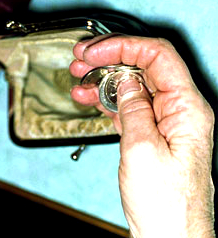Age debate rages as far-off changes come closer
 The mere mention of lifting the pension age has sent many into a spin, but with strong indications coming from various authorities it is considered quite likely something will happen.
The mere mention of lifting the pension age has sent many into a spin, but with strong indications coming from various authorities it is considered quite likely something will happen.
Five years ago the former Labor government announced it would lift the retirement age to 67 by 2023. Now current Treasurer Joe Hockey has flagged the possibility of taking it up to 70 years old in the same time period.
It means Mr Hockey and most from his generation onward would be working several years longer, and have their pension indexed differently to save money as well.
The Treasurer says there is a dire need to do something.
“The IMF fiscal report identified that Australia's increased healthcare and pension spending alone based on current settings would mean an extra $93 billion dollars of government spending per annum by 2030,” he said.
“To pay for the growth in health and pension expenditure, the Government would need to raise the equivalent of all existing company tax over. Alternatively that is more than all the revenue collected by our GST just to pay for the growth in health and ageing.”
Age Discrimination Commissioner Susan Ryan, who still works at 71-years-old, understands the budget imperatives of an ageing population.
“I think it's reasonable for the Government to look to raising that age to 70 say in the future many years down the track if only because it gives a signal to everyone that we have to change the way we're operating now,” Ms Ryan said in an interview with the ABC.
She says it is more important to get employers willing to pay people around that age.
“Recent research showed that of people over 55 there are in the vicinity of 2 million people who could work and would be willing to work full or part time but they can't get work,” she said.
“So once we know that an older person can compete on a fair basis for a job and that employers aren't turning their eyes away from mature workers, then we can start to see an improvement and I hope by the time we get to 2023 and it's 67 that everyone below 67 has the opportunity to work, but we're a long, long way away from that.”
Ian Yates from the Australian Council on the Ageing agrees, telling reporters that workplaces lock out the people the government is trying to force in.
“Study after study has showed that if you become unemployed in your fifties or sixties, it is very, very difficult to get back into the workforce. Age discrimination is alive and well, regrettably, in Australia,” Mr Yates said.
“At the same time as we see the reverse trend, which is more and more people voluntarily working well past 65. That's happening voluntarily.
“People don't have to be forced to do it, but a lot of people have great difficulty. Long-term unemployment among older Australians is rife.”
Economic forecaster Macroeconomics has backed the need for big changes to fix the figures, saying in its annual pre-budget forecast that cuts to assistance for seniors, families with children and corporate welfare are strongly needed.
“We would say to the Government to cut hard and cut early in your term,” economist Stephen Anthony said on Monday.
“It's possible to achieve the adjustments that we have in mind and to phase it over time, for example to implement cuts over a three-year period.
“The point being that the Government needs to make a credible announcement on budget night as to how it's going to address these structural issues.”







 Print
Print